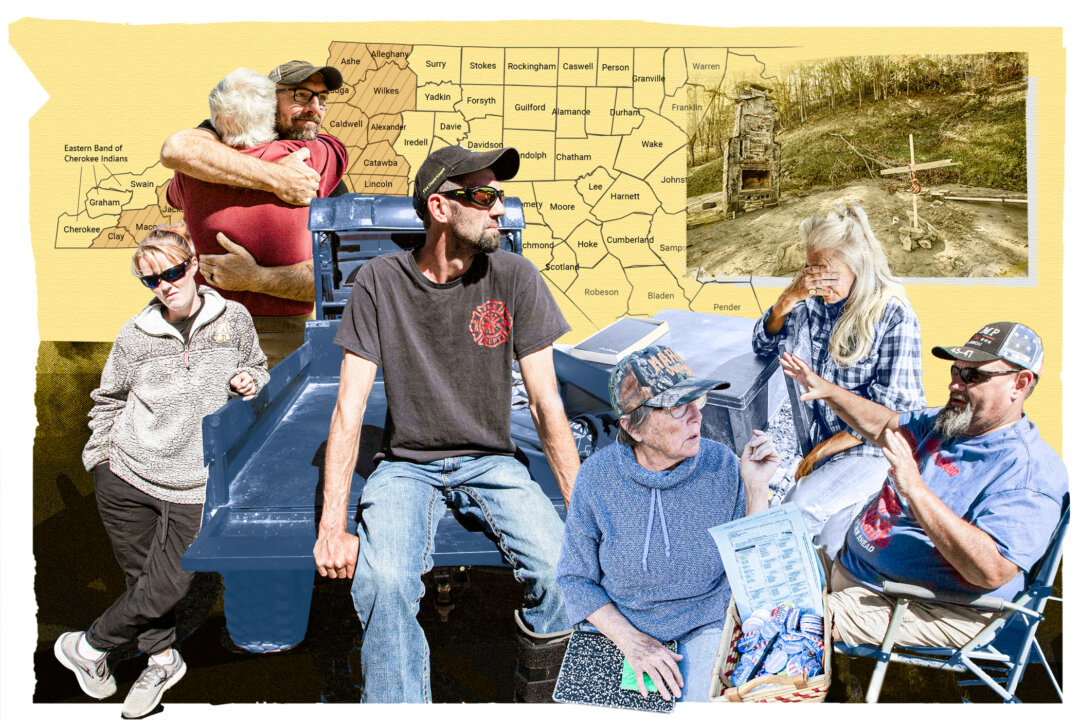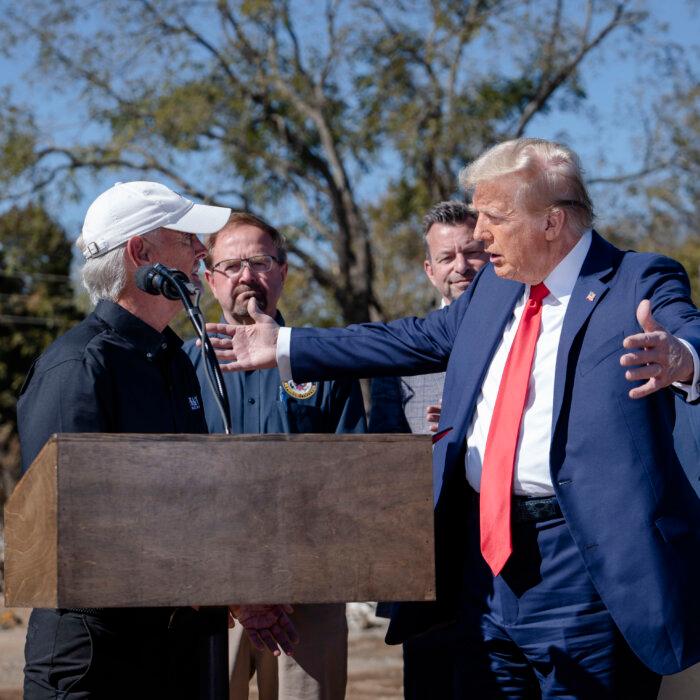BURNSVILLE, N.C.—From the hollers to the mountaintops, the rugged North Carolina survivors of Hurricane Helene who lived through hell and high water are turning out in droves to vote.
Political pundits have been discussing if voting in the Nov. 5 election would even take place in western North Carolina, given the monumental loss and struggle facing Appalachian mountain residents.
Helene, a Category 4 hurricane, struck Florida on Sept. 26, leaving a trail of death and disaster as it traveled northward into North Carolina. At least 95 fatalities tied to the storm were reported in the Tar Heel State, which experienced devastating floods, landslides, and power outages.
The mountains of western North Carolina are considered a Republican stronghold. Storm survivors who spoke with The Epoch Times said the government’s response to what some have called a disaster of Biblical proportions was too little, too late.
Former President Donald Trump won the swing state by 1.3 percentage points in 2020.
The state is considered a must-win for both Trump, the Republican presidential candidate, and the Democratic presidential candidate Vice President Kamala Harris.
The 25 counties in the disaster area comprise 1.3 million registered voters. In 2020, Trump won 604,119 votes to Joe Biden’s 356.902 votes in those counties, according to political analyst Ray Bonifay, who commented on the importance of the region in RealClearPolitics.
Generational Loss
Tammy McMahan, 56, proudly wears an American flag sticker on her shirt proclaiming she voted on a warm October day in Mitchell County, North Carolina.
Her little house on Micaville Loop near Little Crabtree Creek in Burnsville suffered severe damage from the storm. Three generations of her family have lived there.
On the back porch, she points out family treasures that survived Helene’s massive flooding: ornate gold mirrors, a wooden magazine rack, concrete garden statues, and a brass clock that her mother loved.
Like others who spoke to The Epoch Times, her voice broke with emotion at times.
“And so this is what I have left. This is it,” she said, while scanning the items arranged on the buckled porch.
“I’m just … I look around. I’m devastated. I’m sorry,” she said, her voice trailing off.
In the midst of the devastation and loss, McMahan said she voted for Trump in Mitchell County on Oct. 21.
McMahan believes Trump cares more about “mountain people” because he paid a visit to the disaster area before Biden or Harris.
“We are going to need a lot of help in these mountains,” she said.

Through her open back door, she points to the walls of her home—stained with high water marks.
She could tell the water had burst through the back doors of the house she had inherited from her mother, toppling a huge chest so heavy it took two men to move it.
The water had flipped over the living room couch, which was where her mother passed away after being ill. McMahan recalled when her mom took her last breath in that room, now covered with silt.
The force of rushing water washed away much of the concrete yard art that she and her mother had collected over the years.
Yet, a little miracle occurred in the midst of all her misery.
McMahan had buried the urn holding her mother’s ashes beneath a statue of an angel standing among the rose bushes her mother loved.
After the flood water receded from the front yard, the angel and her mother’s remains remained intact. Somehow, the roses were still blooming.
She said that some neighbors didn’t want to apply for FEMA’s $750 in relief because they thought it was a loan. But she had verified with FEMA that the money doesn’t have to be paid back.
Luckily, McMahan wasn’t in the house when Helene hit. A local neighbor who watched the whole thing told her what happened.
“In 15 minutes, the water rose like a lake, and then within 15 minutes, it went down,” she said.

McMahan said that last week, she had reached FEMA, which promised to call her back. She checked her phone to see if she had missed a call.
Mountain Politics
Mitchell County was one of the hardest hit areas. Demographically, it consists mainly of white, rural voters—like much of western North Carolina.
Business was brisk at a Mitchell County early voting site located at the Spruce Pine Fire Department, where McMahan voted.
Roycene Jones, director of Mitchell County Board of Elections, told The Epoch Times a record 1,380 votes were cast on Oct. 17 and Oct. 18 out of 11,162 registered voters.
The state website shows that Mitchell County has registered 6,460 Republicans, 1,049 Democrats, and 3,601 unaffiliated voters.
“We’ve never had this many voters in the first two days since I’ve been here,” said Jones, a nine-year veteran at working elections.
“We are mountain people, and we are resilient. We will build back, and we will be stronger,” she said.
David Frye, 49, who has a side business of selling Trump flags, estimated that about 90 percent of Mitchell County votes Republican.
Frye said people who grew up in the hollers were raised on faith in the Lord and hard work. They believe in self-reliance, with many growing their own crops.
“We live on faith and the promise of tomorrow,” he said.

Nonetheless, he said, people in the area are grateful for the help they have received from groups all over the country and the National Guard.
While FEMA offices were listed in the rural towns of Burnsville and Bakersfield, some of the locals felt the federal government wasn’t providing as much support as they did to suburban areas such as Asheville.
Frye said there were more “boots on the ground” in Asheville, which he could understand in one respect because more people lived there.
But he also attributed the difference in the response to politics.
“I think a lot of the resources went to Asheville because it’s Asheville. We’ve got a Democratic governor, a Democratic president, and that’s a Democratic area,” he said.
Buncombe County, which includes the city of Asheville, suffered a death toll of 42 people.
“The devastation here is from one end of the county to the other,” Frye said of Mitchell County.
“They can’t get out; they can’t get food; they don’t have electricity; they don’t have running water,” he said of those in the mountains who remain cut off due to the damaged roads.
He believes the disaster will drive more people to vote, especially for Trump, due to his early presence in the disaster area.

In neighboring Yancey County, the storm caused 11 deaths, while two deaths occurred in neighboring Mitchell County, according to the North Carolina Department of Health and Human Services.
The same heavy turnout was reported at the early voting site in Burnsville at the Yancey County Board of Elections building.
Inside, several residents were ready to vote. One said the last time she voted was when President Barack Obama was in office. Another young man from Colorado showed a clerk documentation proving he is now a local resident.
Misty Silvers, deputy director of the Yancey County Board of Elections, said the first day of early voting, Oct. 17, at their Burnsville location broke a record with 745 votes cast.
She said the total was 1,600 votes cast as of Oct. 21. The state lists 14,209 registered voters for Yancey County, with 5,379 Republicans, 3,729 Democrats, and 5,009 unaffiliated voters.
“I feel like they really want their voices heard,” Silvers said as a way of explaining the turnout. “We were determined to do it.”
Clarence Randolph, 82, and Nancy Randolph, 74, have been married for 55 years. The residents of Yancey County told The Epoch Times they voted for Trump this election.
The open border issue is a top concern for Clarence Randolph because he’s heard of gang activity around Asheville. For his wife, it’s inflation.
“I can hardly afford to go to the grocery store,” said the 74-year-old.

Democrat Beverly Hill, 76, said her party in Yancey County has been urging its voters to turn out early, as have the Republicans.
More Democrats showed up to vote on the second day of early voting than on the first day, she said.
On social media, the Yancey County Democratic Party was calling for volunteers to help get out the vote in a highly consequential election.
“Understanding that our current focus is on survival, mourning those we lost, and grappling with a new reality, we also need to step out and help one another vote,” the party wrote in a Facebook post. “Our country and our own future here in Yancey County is on the ballot.”

Hollers and Hills
In a holler off Big Brush Creek Road near Green Mountain, 64-year-old John Kruppenbach had braved the storm alone.
Kruppenbach, a proud mountain man, walked barefoot around his property, pointing out storm damage.
Towering trees around his property dipped and swayed like “one of those inflatable dudes,” he told The Epoch Times.
Wind and rain lashed the mountaintops, snapping the trees like toothpicks.
Kruppenbach heard “boom, boom, boom” as trees crashed onto the roof of his house, punching holes in it.
He scrambled to get buckets to catch the rainwater pouring into his home, surprised by the savagery of the storm.
“With trees hitting and water coming in, it seemed possible it was the end,” he recalled.
After the storm, communications were cut out for the most part. A brigade of local volunteers with chainsaws and backhoes cleared felled trees from driveways and roadways, he said.
Kruppenbach said he was grateful when a group from Bitcoin Veterans showed up at his home one day with a generator.
Bitcoin Veterans, with many ex-special forces members, volunteered their help after the disaster in some of the hardest-hit areas. Their unusual name comes from a common interest in the emerging currency system.
Even as the storm lashed his home, Kruppenbach said the thought crossed his mind about how the storm might impact voting.

Like others, he was not impressed with the federal government’s response.
“I would hope folks would see the lack of what the government has done here, and it sways them to vote,” he said.
“I can’t wait to cast my vote to fire this whole administration, which has been a dismal failure,” he added.
Shane Hazel, a U.S. Marine Force Recon combat veteran and member of Bitcoin Veteran, said his group sought out veterans in the hills of western North Carolina as a “force multiplier.”
Their mission was to find veterans and outfit them with communications equipment so they could help other locals.
“These hills are covered with guys like that,” Hazel said.
His group hiked to the top of Big Bald Mountain, on the border of North Carolina and Tennessee, to place a Meshtastic repeater for radio communication service.
Both FEMA and mountain folk had to deal with rumors. FEMA ultimately issued a disinformation page about its North Carolina operation.
Meanwhile, rumors about bands of armed men in the mountains hunting FEMA were circulating.
The Rutherford County Sheriff’s Office reported getting a call on Oct. 12 that a man with an “assault rifle” commented “about possibly harming” FEMA employees working in the hard-hit areas of Lake Lure and Chimney Rock in the North Carolina mountains.
A suspect was charged with a misdemeanor for “going armed to the terror of the public” and was released after posting bond.
The sheriff’s office said initial reports that a “truckload of militia” was involved in the threat were false. Further investigation determined that the man acted alone.
Daniel Stiles, 38, and his wife, Valerie Stiles, 37, are the chief and first captain, respectively, of the Double Island Volunteer Fire Department in Green Mountain, North Carolina. It gets its name from being surrounded by streams.

They were thankful for help from groups like Samaritan’s Purse, which made it into the holler with donations of water, medical supplies, hay, and animal feed for hard-hit farmers in the area.
The firefighters also said they know of people who thought the $750 from FEMA was a loan, so they didn’t apply. But they said the disaster galvanized the idea that people need to vote.
“Oh, it’s made people think a lot more about [voting],” Valerie said. “We’re going to vote.”
Her grandparents, who are in their 70s, are coming out of the mountains to vote for the first time in their lives, she said.
Even as the relief efforts continued in the mountains, Trump visited Swannanoa, a hard-hit area east of Asheville, on Oct. 21 to praise those in storm-ravaged communities who were voting for him.
In the RealClearPolitics average of opinion polls, Trump is leading North Carolina by less than 1 percentage point.
That means a strong Republican turnout in western North Carolina will be necessary for Trump to retake the White House.
Epoch Times reporter Janice Hisle and The Associated Press contributed to this report.






